The story of a passenger being dragged off an overbooked United Airlines flight hit the headlines and led to furious criticism. We take an in-depth look at the data driven marketing story behind those headlines and weigh up the potential long-term brand impact.
We’ve all seen the backlash against United Airlines over the last week, after Dr David Dao was unceremoniously dragged, beaten and bloody, off an overbooked flight (which it now appears wasn’t true and that there was an underlying poor data issue that triggered the whole event), but we wanted to look at the data driven marketing story behind the headlines and the long-term brand impact.
Eric Schiffer, CEO of Reputation Management Consultants, termed United’s handling of the incident ‘brand suicide’. “When you go onto a United flight, you shouldn’t have to be concerned there will be blood or you will get slammed in the face,” Schiffer said. “I think you will see an effect on sales from those who are disgusted by the gruesome action. And it’s catastrophic for a brand’s trust.”
So, if you’re a marketer this week at United what do you do? How bad is it for the brand and do you pull all your advertising until things die down?
Well, on the surface it doesn’t look good.
We started by looking at Google trends and, as you can see below, not unexpectedly there has been a huge spike in searches. People are interested, although it seems more people are interested in the stock price than the health of Dr David Dao. More of that later.
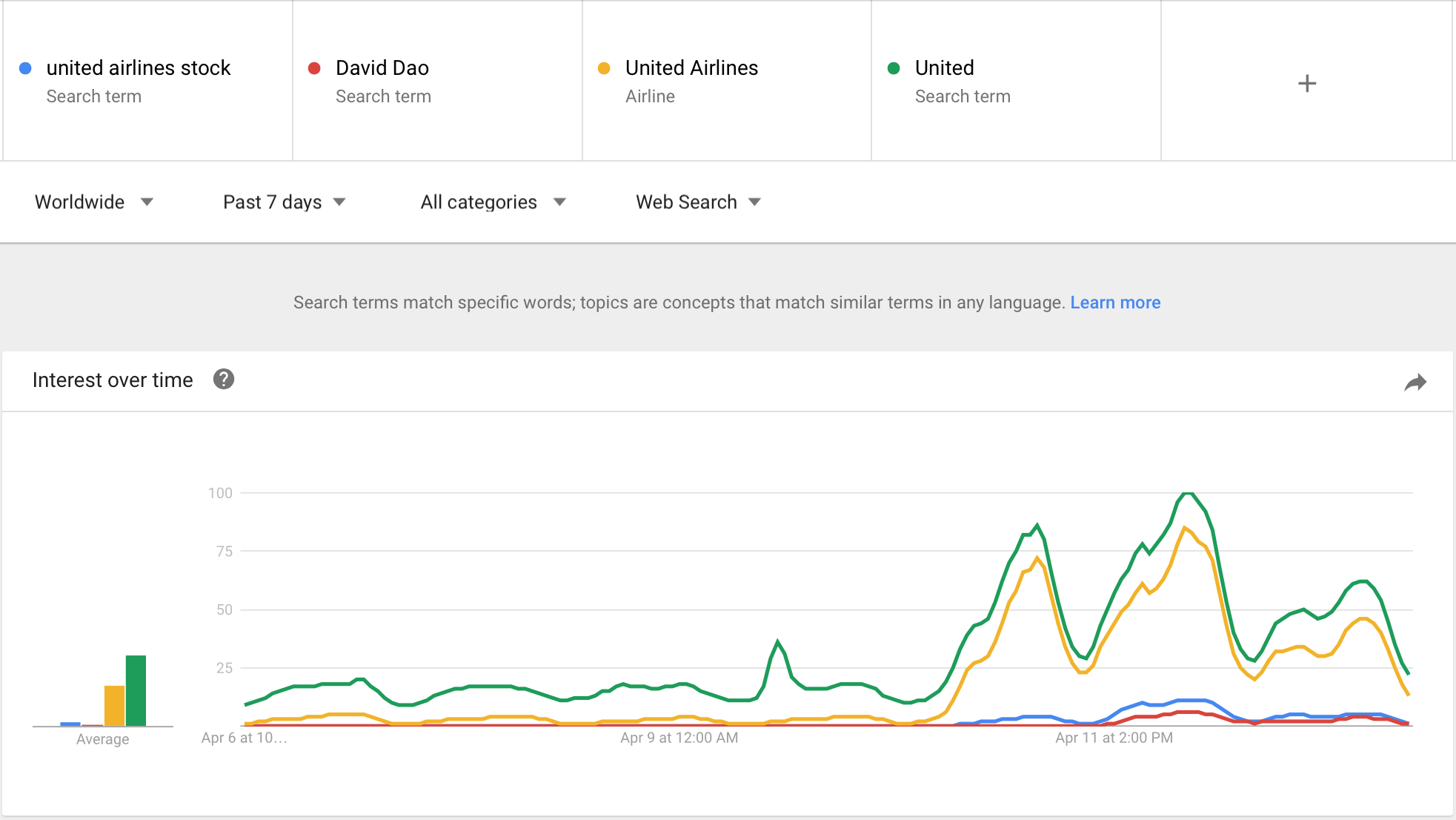
It’s worth looking at Google trends in a little more detail. When I looked at searches for United Airlines versus David Dao you can see the huge regional interest in the man rather than just the story, where anger over the perceived deliberate choice of an Asian man to be removed from the flight has led to calls for boycotts in the region. Damaging, yes, but given the relative lack of revenue from the region for United, not critical, although long-term route negotiations may become tougher.

We also decided to look at searches on United’s stock price. Again not surprisingly, regions where people were most likely to own the stock garnered high search volumes. It does beg the question of how many people were worried about their portfolio ahead of Dr Dao.
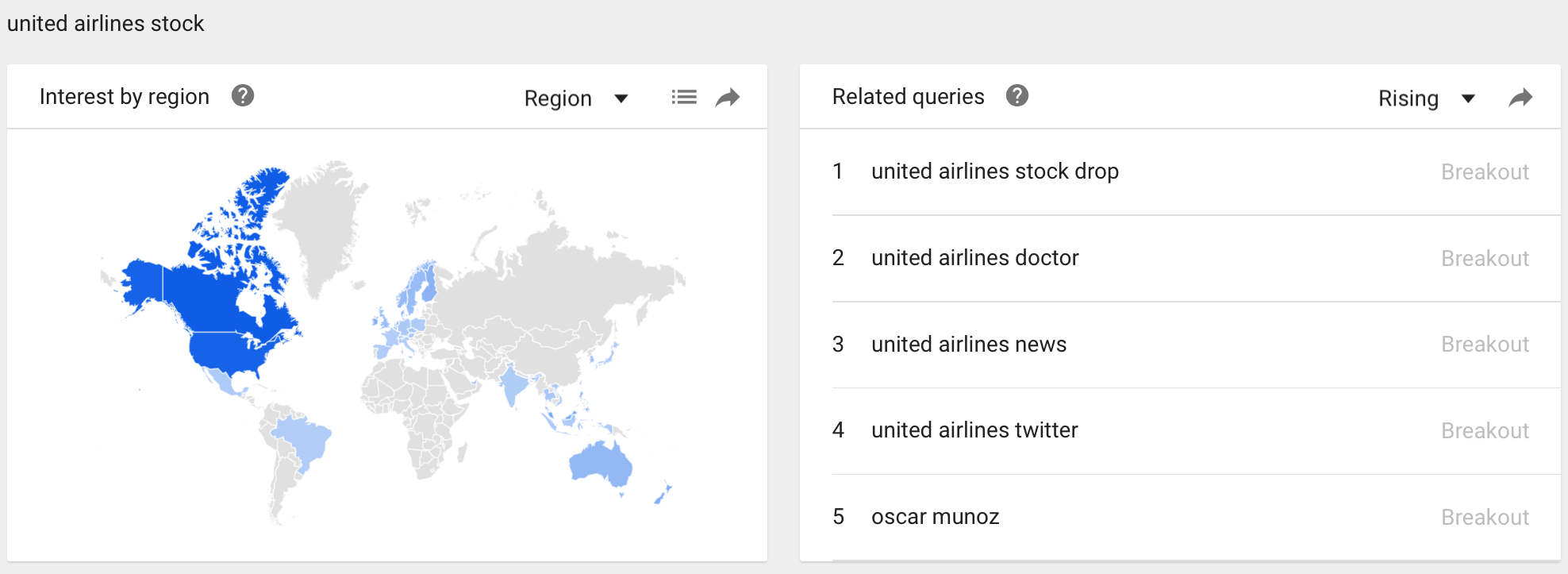
Short term stock price effect on United Airlines
So, for many, the immediate concern was the effect on the stock price, but as you can see there is little to be worried about. Admittedly, the airline posted some good results in the meantime, but effectively the price crash immediately after the event has been rolled back and, given that stock prices are a reflection on what brokers and analysts believe is the future earning potential of a company (which therefore must include its brand), the consensus is one of ‘move along, nothing to see here’.
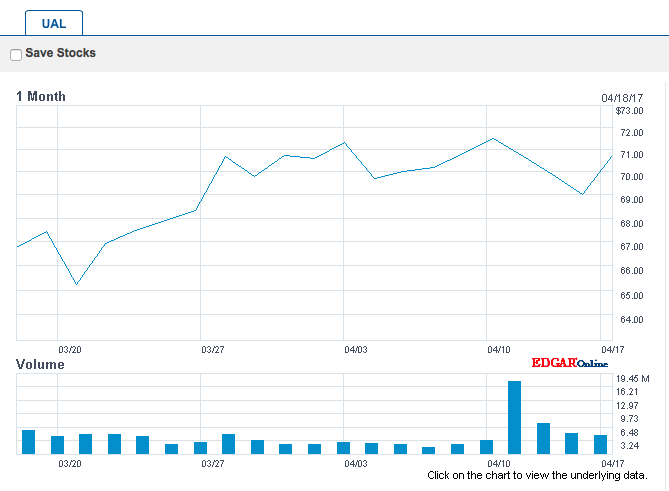
User generated content takes over brand content (for now)
Adverts are now popping up around the web with a new take on United’s brand. Some of the best are listed over on The Drum. My personal favourite new strapline is ‘Not enough seating, prepare for a beating’. They even have their own hashtag trending on Twitter #NewUnitedAirlinesMottos (be prepared to laugh out loud) and this take on Naked Gun for the best video Meme.
However, the firestorm does now appear to be receding somewhat and, while the poor response from United’s CEO kept the media fire burning hotter and longer than it might have, the moment has already gone. United could screw up again, competitors are cashing in and running campaigns this week to remind consumers of United’s mistakes and, of course, there will be a FAA report and a ‘settlement’ with Dr David Dao to navigate.
Brand impact: SEO brand damage for United is likely to linger
The long-term brand damage for many brands is not in the printed word, which inevitably fades from view, but online where your bad news tends to linger. A search this week for United Airlines brings back the following (pictured left above-the-fold, right below-the-fold). Above-the-fold might be less of a problem. Once the heat dies off and the AMP (Accelerated Mobile Pages) and snippets pick up newer stories, this view will return to normal.
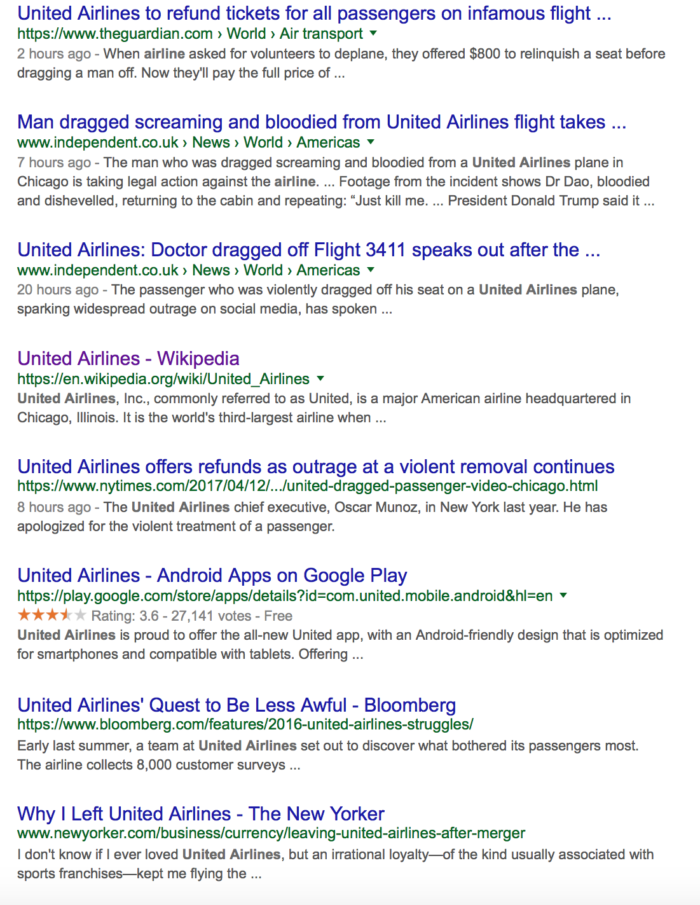
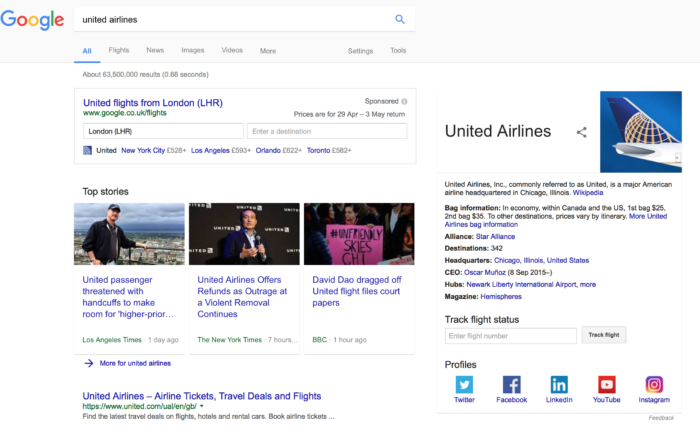
However, below-the-fold is another issue. There we find story after story from leading, high authority sites, that will linger for some time, damaging the brand and potentially reducing sales. Marketers arriving for work at United this week should be thinking long and hard about how they overcome this in the coming months (a large investment in content is probably key).
We know that search does matter to United. As you can see below, 28% of its traffic is from Organic Search. Will this drop off? Probably not, because what’s key for marketers is the search intent by the user. The top key words are actually branded terms or functional searches (check-in) so not as likely to affect sales.
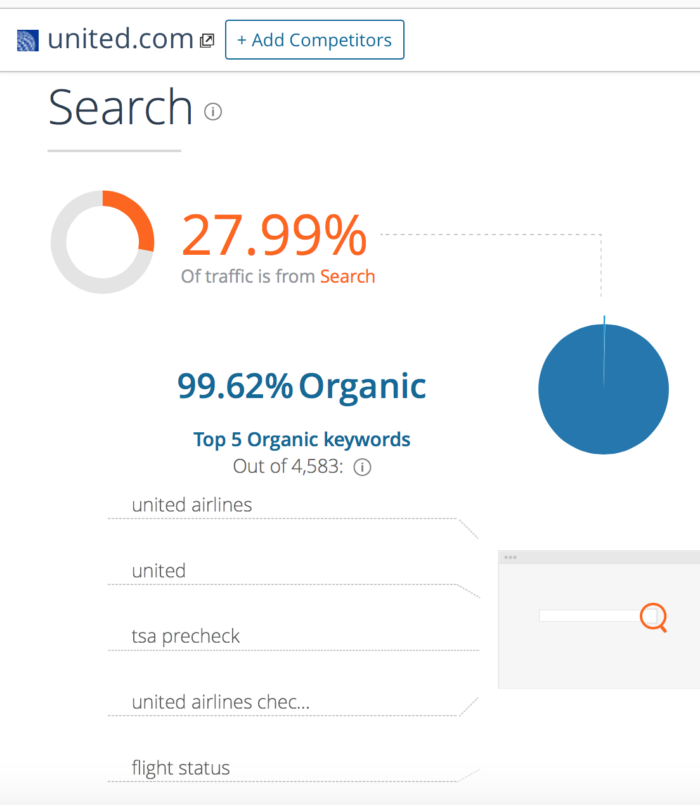
When we look at ‘long tale sales searches’ such as ‘united airlines flight to dallas from Newark’ then you get a very different set of results. As you can see below, not a single mention of the removal of Dr Dao. People have short memories and without the reminders will revert to the best/cheapest option for their travel very quickly.
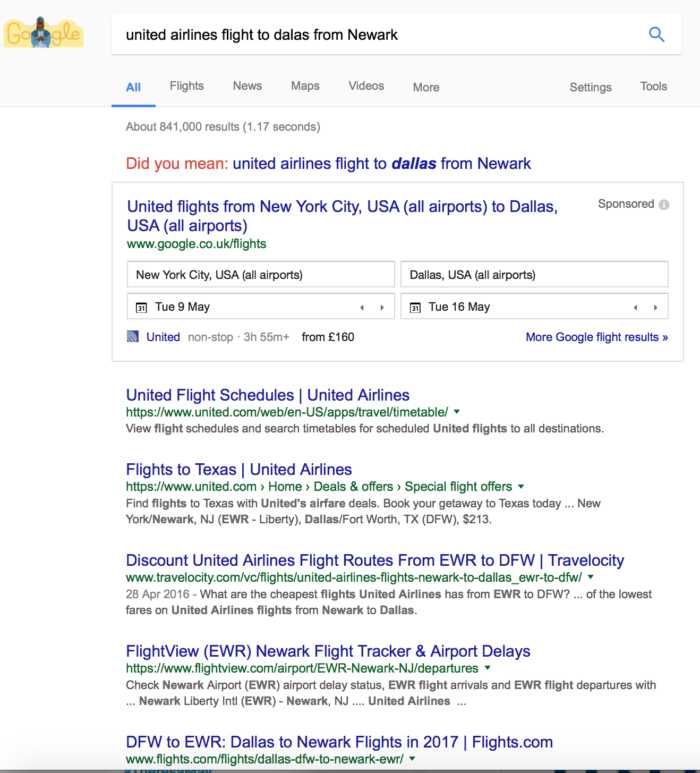
The real problem for US airline customers
The bigger problem facing the US airline industry is the lack of competition and virtual monopoly that the big four have in many parts of the US. As this graph from the Economist shows, United Airlines and American Airlines are already down at the bottom of the customer experience pile when matched against other global carriers (they are expensive and not very good) and yet profits and passenger numbers are high.
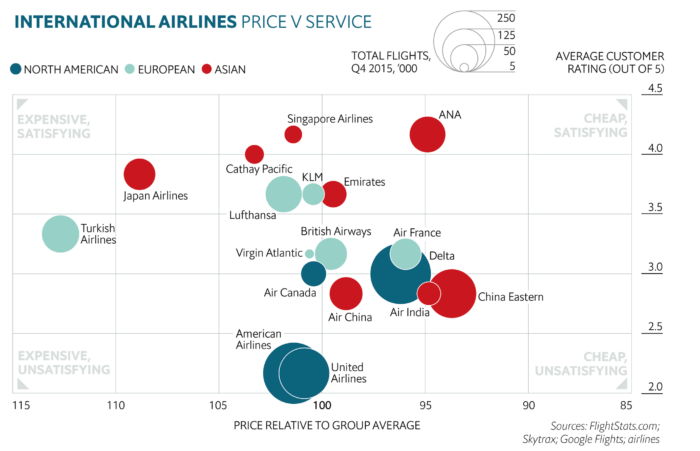
Why? Because they can. Merger after merger has led to the destruction of all real competition and therefore a strategy of poor service and high prices will lead to the maximum return for shareholders and, remember, these are shareholder driven organisations first and foremost, as can be seen by the initial reaction of United leadership.
Southwest, American, United Continental Holdings and Delta now constitute the Big Four, accounting for 85 per cent of the industry, said Seth Kaplan, an industry analyst and managing partner of Airline Weekly. Try getting in or out of Dallas and not fly with United and you’ll see what the problem is. One of United’s straplines is: ‘We know you have a choice when you choose to fly’. The truth is that most of the time you don’t have a choice! This is the underlying problem the industry, and more importantly its customers, face.
The case of Dr Dao’s removal won’t be the last one, either. Overbooking will continue as it makes short term financial sense. Delta has now announced up to $10,000 for passengers asked to change and, while this might be a well intentioned attempt to reduce the problems associated with the 1200 cases they alone faced last year, it may be a dangerous game. As passengers become more aware of the process, and aware of the rewards that collusion might get them, then game theory would predict more chaos not less.
Will underlying culture damage United in the long-term?
Given the data above, the sad conclusion must be that the brand impact and short-term damage to United will be marginal and quickly forgotten and that in the medium-term (a few months) there will be little residual effect. History backs this up – this is not the first time that United has had PR ‘disasters’. It had ‘leggingsgate’ and ‘Guitargate’ and bounced back with little problem.
However, I do believe that eventually a culture that totally disregards the customers it serves will suffer. This is about more than one incident, no matter awful it was, and more about the ability of the organisation to deliver a service that people want. Marketers at United need to push for a new approach to the customer and shareholders need to ask what the best strategy for creating long-term value is, while leadership needs to innovate rather than continue the race to the bottom of the service/price rung. After that, all that’s needed is a bit of competition!
Read also:
Customer service: here’s the big picture
Are you sitting on a data gold mine? What all brands need to know















Leave your thoughts